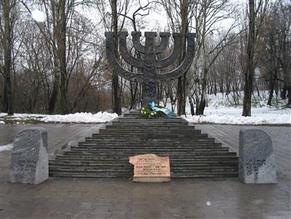|
World Jewish News

70 years ago this week, 33,771 Jews were murdered in Babi Yar, near Kiev, the Ukrainian capital. Picture: the Babi Yar Memorial in Kiev.
|
Official memorial events at Yad Vashem to mark 70th anniversary of Babi Yar massacre of Jews
05.10.2011, Holocaust A memorial event marking 70 years since the murder of the Jews in Ukraine, including the massacres at Babi Yar and adjacent areas, will be held at Yad Vashem in Jerusalem on Thursday.
The wreath-laying ceremony will take place in partnership with the Association of Ukrainian immigrants in Israel, in the Hall of Remembrance with the participation of Israeli Minister of Public Affairs and the Diaspora Yuli Edelstein and Ukrainian Minister of Culture Mykhailo Kulynyak.
70 years ago this week, 33,771 Jews were murdered in Babi Yar, near Kiev, the Ukrainian capital.
As the German army advanced eastward in the fall of 1941, similar mass murders of Jews took place throughout the region during this period.
Michael Sidko, who was a child during the Babi Yar massacre and survived, will rekindle the eternal flame.
On Thursday evening a special memorial concert “Requiem for Babi Yar” will be performed at the Jerusalem Theater by the Jerusalem Symphony Orchestra - IBA, and the Dumka choir, under the baton of Vladimir Sirenko from Kiev. Israeli President Shimon Peres will attend this event.
On the same day, the first ever educators’ seminar for Ukrainian graduates of Yad Vashem’s International School for Holocaust Studies seminars will take place in Kiev.
The one-day event will focus on the Holocaust in the Ukrainian collective memory. Some 100 educators are expected to participate.
Recently Yad Vashem signed an agreement with the national archives of Lithuania, and will soon sign new agreements with the national archives in Ukraine and Belarus.
Under the agreements, Yad Vashem will copy numerous documents related to the Holocaust period located in the state archives of Lithuania, Ukraine and Belarus.
A similar agreement was signed earlier this year with the Ukrainian SBU (secret service) archives. Bringing copies of these archives to Yad Vashem will make them available to researchers in Israel and around the world.
"This is a significant achievement,"" said Yad Vashem Chairman Avner Shalev.
"Acquiring this material will help enhance research into the Holocaust in the areas of the FSU, as well as assist the recovery of names of Jews murdered in these areas."
The archives contain official documentation of the occupying Nazi regime, as well as that of the local authorities, which sheds light on the Holocaust period, in particular the critical years of 1941-43.
Among the material in the archives is interesting documentation from the village, city and regional administrations, from which it is possible to get details about the daily life of the Jews before and after ghettos were established.
Documents such as official requests from the local authorities to the Germans regarding Jewish artisans in the ghetto, or a city ordinance forbidding the confiscation of Jewish property by theft, but requiring it to be brought in an orderly fashion to the city warehouses are among the archival materials.
Among the documents, are many lists of Jews’ names, including lists of victims, forced laborers, residents of particular towns, Jewish partisans and more.
EJP
|
|
